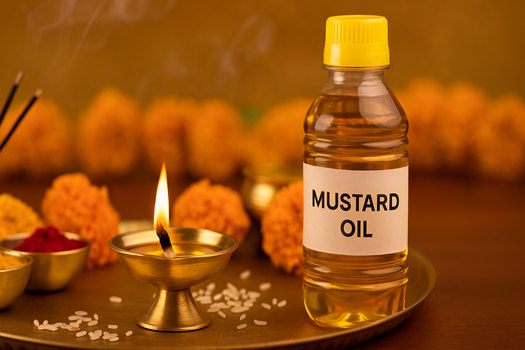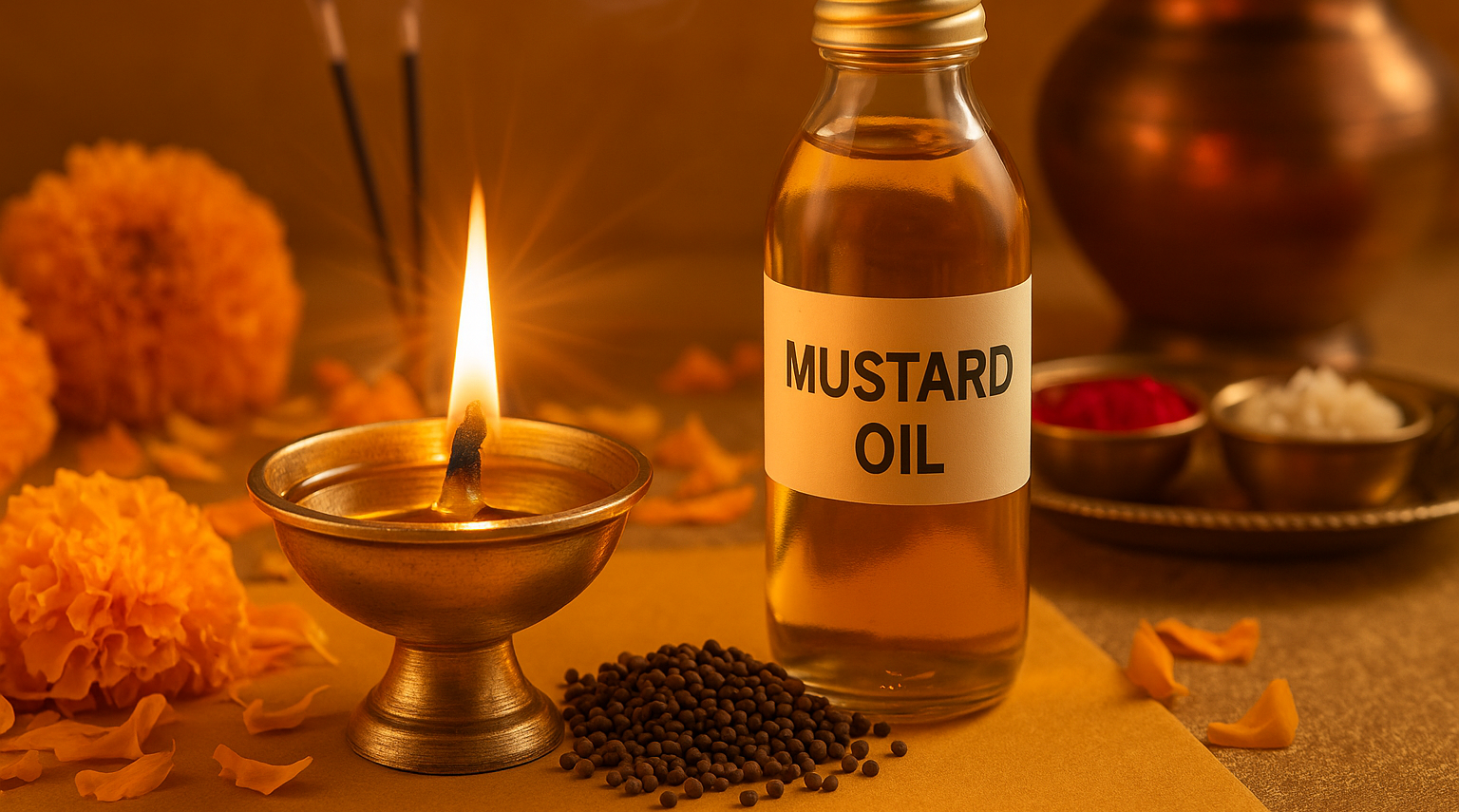Why Do People Ask About Mustard Oil in Pooja?
Many people wonder: Can we really use mustard oil for pooja lamps? This is an important question because in worship, every detail matters—whether it is the flowers, the mantra, or even the oil we use for the diya.
Using the right oil is not just about lighting a flame. It is about purity, devotion, and following traditions. In this blog, we will explore what scriptures say, how different regions practice, and whether mustard oil (sarson ka tel) is the right choice for your pooja.
What Exactly Is Pooja and Why Is Oil Important?
A pooja is a worship ritual in Hinduism. It can be done at home or in temples. People offer flowers, light lamps (deepa or diya), chant mantras, do arati. The size can be small (daily family pooja) or large (festival or temple rituals).
The oil in the lamp (deepa) plays a big role:
- It keeps the flame alive, which represents knowledge removing darkness.
- It adds fragrance or atmosphere to the space.
- It symbolises purity and energy, creating a sacred environment.
- Oils can also be used for abhishekam (pouring over idols), for purification, or offerings.
What is mustard oil (Sarson ka tel)?
Mustard oil, or sarson ka tel, is common in Indian households, especially in the north and east. It has a strong smell, burns with a yellowish light, and is available everywhere. But does that make it right for Puja? Let’s find out.
Do Scriptures Mention Mustard Oil for Lamps?
To be sure if mustard oil is allowed, we must see what the scriptures and tradition say.
In Narada Purana, there is a passage that mentions mustard seed oil (white mustard) is among the oils that can be used in lamp offerings. It notes that mustard seed oil helps in the destruction of ailments.
Many articles on choosing lamp oil list mustard oil as a valid oil in many rituals. It is often used in North India, especially for certain gods and certain days.
Traditional texts like the Smritis and Puranas emphasise the purity of oil, cleanliness, the brightness of flame, and whether the oil is pure or has fragrance. But there is no strict universal law forbidding mustard oil.
Difference in traditions:
- In North India, mustard oil is more often used, especially in villages and for deities like Shani, Kali, Hanuman, etc.
- In South India, oils like coconut, sesame (til), and ghee are more commonly used. Mustard oil is less common there.
What Is the Spiritual Meaning of Mustard Oil in Pooja?
When people use mustard oil, it has spiritual meanings:
The strong aroma helps wake up the senses. It is believed to ward off negative energies because unpleasant or strong smells are thought to chase away evil influences.
Mustard oil is traditionally associated with deities like Shani Dev, Kali, and sometimes Lord Shiva. In some rituals, offering mustard oil or lighting a lamp with mustard oil is thought to be very powerful.
Certain days: For example, Saturdays (Shani), or special poojas for Kali, some folk traditions prefer mustard oil. It is believed to reduce malefic effects like “doshas” (astrological faults).
But there are also taboos in some communities: some priests or elders may insist only on ghee or sesame oil, saying that the smell of mustard is too strong or the flame isn’t as clean.
What Should You Keep in Mind Before Using Mustard Oil?
If you decide to use mustard oil, here are useful things to check.
- Edible vs Non-edible oil: It is better if oil is food-grade (edible), clean, not adulterated. If there is a “pooja oil” version, make sure it is pure. Impure oil creates more smoke an odd smell.
- Purity & cleanliness: Use clean lamps (diya), good wick (cotton), and a clean vessel. The vessel should be washed, free from dirt or leftovers. The lamp place should be pure.
- Smoke, smell & safety: Mustard oil gives a strong aroma and may produce soot. If too much smoke, it may irritate the eyes or lungs. So the batti should be proper size, lamp not overloaded. Ventilate the room. Also keep fire safety in mind: open flame.
- Burning quality: A well-prepared lamp with mustard oil burns reasonably, but flame may flicker. Keep the wick trimmed. Sometimes mixing with a small amount of ghee or other milder oil helps.
What Are the Pros and Cons of Mustard Oil Lamps?
Here are the advantages and disadvantages to help devotees decide.
Pros:
- Widely available in many parts of India, affordable.
- Has strong traditional/folk value; many households already have it.
- Strong aroma seen as effective to purify environment.
- Helps maintain continuity of cultural and family tradition.
Cons:
- Strong smell may be uncomfortable inside a closed room.
- More smoke and soot than milder oils like ghee or sesame.
- Risk of adulteration (fake or mixed oil) which may spoil purity.
- In some communities or temples, tradition might prefer ghee or sesame only, so mustard oil may not be accepted everywhere.
How Does Mustard Oil Compare with Other Oils?
To understand mustard oil better, let’s compare with other oils.
| Oil Type | Flame Quality | Smell & Aroma | Purity & Symbolism |
| Ghee (clarified butter) | Bright, clean flame, less smoke | Sweet / mild smell, very auspicious | Very high; many temples prefer ghee; linked with divinity |
| Sesame Oil (Til Oil / Gingelly) | Good flame, moderate smoke | Mild nutty smell, more gentle | Traditionally used for many deities, said to remove doshas |
| Coconut Oil | Steady flame, cooling effect | Mild, pleasant, clean | Favoured in South India; symbolic of purity and peace |
| Mustard Oil | Good flame, possibly flickering, more smoke | Strong, pungent aroma | Good symbolic value in certain traditions; less used in temples that prefer milder oils |
So mustard oil has its place, especially where smell and flame effects are acceptable, and tradition supports its use.
Where Is Mustard Oil Commonly Used in Pooja?
- North India (UP, Bihar, Punjab, Bengal): Mustard oil is often used in poojas at home. For example, in Chhath Puja (in Bihar / UP), mustard oil lamps are lit.
- East India (Bengal, Assam, Odisha): Mustard oil is part of daily cooking and sometimes for pooja lamps. But often mixed tradition: sometimes ghee or sesame oil too.
- South India: Rare to use mustard oil. More common oils are coconut oil, sesame oil, ghee. Temples often follow Agama or local ritual texts that specify certain oils.
- Specific communities/sects: For deities like Shani, many devotees prefer mustard oil. In some stories and folk rituals, mustard oil is offered to Shani Dev.
Also, some communities may avoid the strong smell, especially inside small houses, or when guests come, so they might switch to milder oil.
If I Want to Use Mustard Oil, What’s the Best Way?
If you want to use mustard oil for pooja, then there are good steps to follow here:
- If possible, choose pure food mustard oil. Avoid adulterated oil. If the non-edible or marked for the “Pooja Oil” version, check the quality.
- Clean everything: lamp, batti, vessel. Use a cotton batti, so the flame is stable.
- Use the right lamp size: not too small, so the smoke is low. Trim wick to avoid sooting.
- Avoid overfilling lamps. Keep the oil level medium so that the flame burns well.
- Light a lamp in a clean place. Allow ventilation so that the smoke can go out.
When to use mustard oil vs alternative
- Use mustard oil when tradition in your family or region accepts it.
- On festivals or rituals dedicated to gods like Shani or Kali, mustard oil is particularly meaningful.
- For daily worship, if the smell or smoke harasses people, perhaps mix mustard oil with a milder oil, or use sesame/ghee.
Respect local tradition:
- If the temple or priests say to use a certain oil, follow it.
- Ask the elders in your home what they always use.
- Understand that the intention of devotion (devotion) is very important – the heart matters more than the material.
Conclusion
So, can we use mustard oil for pooja? Yes, in the right circumstances, it is acceptable. It is allowed in many traditions, especially in North and Eastern India. But it works best when the oil is pure, the lamp is clean, the smell and smoke are managed, and when the tradition supports it.
What matters the most is devotion, the purity of the heart, and faith. Oil is just a medium to help in our prayer and worship. If we use mustard oil with respect and clean practice, it can serve well.
Your worship should be filled with light, purity and faith. Let your lamp shine, and your devotion guide you.
FAQ’s
1. Can we use mustard oil for pooja lamps (diya)?
Yes, mustard oil can be used for worship lamps in many traditions, especially in North and Eastern India. However, some temples or families prefer ghee or sesame oil, so it is best to follow your regional or family customs.
2. Is mustard oil good for Shani Dev Puja?
Yes. It is considered very auspicious for Shani Dev to illuminate a mustard oil lamp on Saturday. Devotees believe that it helps in reducing Shani dosha and brings protection from negative effects.
3. Can mustard oil lamps be burnt daily at home?
If your family tradition allows it then you can use it daily. However, since it has a strong smell and it can cause smoke, some people prefer to mix it with ghee or sesame oil for every day use.
4. Which oil is the best for a lamp in a puja, ghee or mustard oil?
Ghee is considered pure and most auspicious, especially in temples and major rituals. Mustard oil, however, is powerful in some traditions and is associated with specific deities such as Shani and Kali. Both are acceptable based on customs and intentions.
5. Why do some people avoid mustard oil in worship?
Some avoid its strong smell, high smoke and soot compared to ghee or sesame oil. In South India, mustard oil is rarely used because coconut and sesame oil are more traditional.
6. Is it okay to add mustard oil with ghee or sesame oil to the lamp?
Yes. Mixing mustard oil with ghee or sesame oil is a common thing. It balances the strong smell of mustard oil, reduces smoke, and still retains spiritual importance.


